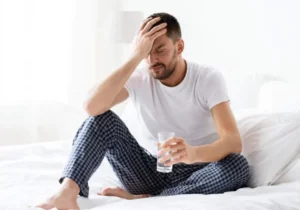While you sleep, parts of your body continue to work at full speed. Read now why sleep is so important for well-being and health, and what happens in your body during sleep.
From an evolutionary perspective, sleeping is a bad idea. For hours, you’re defenseless and don’t notice anything. And you can’t search for food during that time either. Nevertheless, almost all animals, including us humans, need to sleep every night to stay healthy. This alone shows the important functions that sleep must have for the body.
During sleep, your body creates connections in the brain, consolidates memories, produces immune cells, and stimulates wound healing and regeneration—and these are just a few of the things scientists have already discovered about sleep. To a large extent, nighttime rest remains mysterious, even to researchers.
In this article, we have listed some interesting facts about why sleep is so important and what happens in your body and brain.
In our health portal, you will also find further articles on healthy sleep that delve deeper into many of the topics we present here:
Why do we sleep?
It’s not for nothing that we humans spend around a third of our lives sleeping. Sleep is vital, and if you don’t get enough or sleep poorly, it affects your well-being and performance and increases your risk of various diseases.
Why do we get tired and want to sleep?
Scientists have not yet fully understood all of the effects and functions of sleep. What is clear is that sleep is essential. Humans need it to regenerate and so that the brain can process the impressions and information of the day.
Our body has therefore taken several precautions to ensure that we become tired and want to sleep. This process is primarily controlled by two processes in the body: the circadian rhythm and sleep homeostasis.
Day-night rhythm: The circadian rhythm is the internal clock that alters bodily functions throughout the day and night. Late in the evening, your body temperature and blood pressure drop, and at the same time, your brain releases the hormone melatonin, which makes you tired and helps you fall asleep. Melatonin production depends primarily on how much light reaches your eyes. However, people are wired differently and have different rhythms: some get tired earlier in the evening, others later. Artificial light, and especially the light from screens, can disrupt the circadian rhythm and cause people to go to bed later and later.
Sleep homeostasis: This refers to a “sleep pressure” that increases the longer you have not slept, similar to hunger and thirst. This occurs, among other things, through the neurotransmitter adenosine. The longer you are awake, the more adenosine accumulates in the body, which in turn increases the need for sleep. Caffeine can block the receptors to which adenosine binds—this is probably the mechanism by which coffee, black tea, and cola keep us awake.
Sleep in animals
Sleep is something that exists in various forms throughout the animal kingdom. Birds and mammals, in particular, have very similar sleep habits to humans.
Although there are debates among researchers about whether certain species of frogs and birds really sleep, scientists have so far not been able to conclusively prove that any animal species does not engage in at least some form of night or daytime rest.
Marine mammals such as whales, dolphins, and seals are a special case. They sleep with only one half of their brain, while the other half remains awake. This allows them to regularly emerge from the water to breathe air despite sleeping.
Did you know? The larger mammals are, the less sleep they generally need. Bats sleep 18 to 20 hours a day, cats and house mice 12 to 13 hours. Many very large animals, such as giraffes, elephants, and horses, sometimes sleep only three to four hours or even less in the wild.
The sleep phases
Sleep can be divided into four stages that repeat throughout the night: falling asleep, light sleep, deep sleep, and REM (rapid eye movement). Each of these stages lasts approximately 90 minutes, with the proportion of each stage shifting throughout the night. At the beginning, you spend more time in deep sleep, and towards the end of sleep, you spend more time in the REM phase.
The phases vary greatly. Your brain is highly active during the REM phase. During this phase, you have dreams that you are most likely to remember. During the deep sleep phase, your body relaxes, and you hardly dream and find it difficult to wake up.
Do the phases of the moon affect sleep?
Many people swear that they sleep worse during a full moon. This may sound esoteric to many at first, but whether this connection can be scientifically proven is a controversial topic in sleep research!
Some scientists believe that sleep problems during a full moon may be a legacy of human evolution. Studies of people who still live as traditional hunter-gatherers and largely without electric light show that these people go to bed later on nights around a full moon because they have more light.
This is the basis of a theory developed by the researchers: The bright moonlight was the reason our ancestors stayed up later on full moon nights. Although we can now hide the moonlight behind blinds, our bodies may still “notice” that it’s a full moon, for example, due to the moon’s greater gravitational pull. The body may still associate this with the brighter, more active full moon nights of our ancestors, and cause us to sleep less.
What happens in the body when we sleep?
Sleep is vital. We’ve known this for a long time, partly because we’ve observed the dire consequences of sleep deprivation and lack of sleep.
During certain phases of sleep, different areas of the brain are active to process emotions and information, establish connections, and organize memory. But the rest of the body is also active at night [1].
The functions of sleep
Other vital functions of sleep include [7] – [9] :
Development: The brain, in particular, develops rapidly at night. This could be one of the reasons why newborns and children sleep so much.
Regeneration and wound healing: Growth hormones are released, and new cells are produced, which helps the body regenerate. Researchers have observed that wounds heal more slowly in rats when the animals are sleep-deprived.
Immune system: Important immune defense processes take place during sleep. Certain immune cells are produced, and the immunological memory with which the body recognizes pathogens and foreign substances also develops at night. Studies suggest that insufficient sleep increases the risk of infections.
Save energy: Studies show that people use significantly less energy while sleeping than when they simply rest while awake. Therefore, without sleep, we would consume significantly more energy.
The connection between sleep and the immune system works both ways: When you’re sick, you often feel the need to sleep more. Various inflammatory factors in the body likely play a role here, making you sleepy and thus indirectly encouraging you to rest. Researchers are currently exploring the many connections between the immune system and sleep [9] .
How do we learn and make memories while we sleep
One of the most important functions of sleep is information processing: memories are stored, learned information is processed, and less relevant information is deleted. You could also say that the brain “cleans up.” It cuts certain connections between synapses, while others remain and are strengthened. Still other neural connections are formed.
This allows us to filter out the relevant information from the flood of information that bombards us during the day, essentially freeing up memory that we can fill again the next day. This is also why we learn things better after a good night’s sleep. The brain only forms the necessary connections during the corresponding sleep phases.
So, staying up all night before an exam or an important presentation is not a good idea. Your brain will be able to process what you’re learning much better if you get enough sleep [10], [11] .
Why do we dream? Scientists still don’t understand the exact function of dreams. They presumably help us process emotions we experience during the day. What is clear is that everyone dreams for about two hours every night – even though many rarely remember their dreams [1] .
How many hours of sleep do I need?
How much sleep we need varies from person to person. Studies show that most adults feel rested and alert after seven to eight hours of sleep—this is the amount of time many experts recommend.
What time should I go to bed? “The best time to sleep is before midnight” – that’s a myth! It’s important to listen to your internal clock and, if possible, go to bed at the time you feel tired. As a night owl, you’re not doing yourself any favors by trying to go to bed at 10 a.m. However, there’s a rule of thumb: It’s best to go to bed at the same time every day, even on weekends. This helps your body adjust to a regular rhythm.
Recommendations of the US Academy of Sleep Medicine
The American Academy of Sleep Medicine recommends that adults between the ages of 18 and 60 sleep more than seven hours. Sleep medicine specialists recommend an average of seven to nine hours of sleep per night, depending on individual needs.
While there are short sleepers who naturally get by on, say, five hours of sleep a night, these individuals are relatively rare. Often, too little sleep affects people without them even noticing because they’ve become accustomed to the constant lack of sleep. However, it can still have harmful long-term consequences.
How much sleep do people need at what age?
Very young children, in particular, sleep significantly more than adults. Over time, we humans need less and less sleep until our sleep needs settle at the average seven to nine hours in adulthood.
In this table, you can see the recommendations of the US sleep experts for the respective age groups [14] :
| Old | Recommended sleep duration |
| 0-3 months | 14-17 hours |
| 4-11 months | 12-15 hours |
| 1-2 years | 11-14 hours |
| 3-5 years | 10-13 hours |
| 6-13 years | 9-11 hours |
| 14-17 years | 8-10 hours |
| 18-64 years | 7-9 hours |
| 65+ years | 7-8 hours |
In addition to this recommended sleep duration, the Academy also provides ranges for “adequate hours of sleep.” For adults between 26 and 64, for example, this range is six to ten hours. Anything within this range can be unproblematic if you feel comfortable and well-rested. If you consistently sleep more than ten or fewer than six hours, it may be worthwhile to discuss your sleep with a doctor or therapist.
How well do people in Germany sleep? According to the 2017 TK Sleep Study, every second adult in Germany sleeps six hours or less, significantly less than recommended by the US Academy of Sleep Medicine. Four out of ten respondents also reported not waking up feeling rested in the morning. Another finding of the study: Those who report sleeping better and longer also appear to be healthier and happier [15] .
What happens if you get too much or too little sleep?
If you consistently sleep more than ten or fewer than six hours, you are outside the recommended sleep-related guidelines. In this case, it may be worthwhile to discuss your sleep with a doctor or therapist, or to try to improve your sleep hygiene yourself.
What happens when you lack sleep?
Chronic sleep deprivation makes you sleepy and fatigued during the day, and it also reduces your physical and mental performance. Among other things, people who sleep too little become less focused and forgetful, and have slower reaction times.
Studies have also shown that chronic sleep deprivation increases the risk of many diseases, such as depression, anxiety disorders, cardiovascular diseases, diabetes mellitus, and obesity [12].
Can you catch up on sleep?
The need for a good night’s sleep is even greater after a few nights of poor sleep. It’s possible to catch up on sleep and then feel more alert and focused.
Researchers investigated this in a laboratory study. The participants were allowed to sleep only four hours a day for several days. On the following nights, they slept longer on average than they normally would. However, it took several nights of catching up for most of them to regain their full cognitive performance [13].
Can too much sleep be unhealthy?
Should there also be an upper limit for healthy sleep? This isn’t clear: According to medical experts, it’s not yet possible to say whether sleeping more than nine hours a night could cause health problems.
There are several large studies showing that people who sleep nine hours or more per night have, on average, a lower life expectancy. However, some scientists believe this may be a purely statistical correlation. People who sleep a lot often live with other conditions that can negatively impact their health, for example, low socioeconomic status or depression [16].
A very high need for sleep may also be a sign that you are sleeping poorly or inefficiently, or that you regularly need to catch up on sleep from other nights [12], [14].
Sleep: At a glance
Why do we sleep?
First, our internal clock controls when we are awake or asleep. In the evening, the brain releases the hormone melatonin, which makes us feel tired and fall asleep.
Second, there’s a “sleep pressure” that builds up in your body the longer you’re awake. Among other things, the neurotransmitter adenosine accumulates in your body throughout the day and is only broken down again during sleep.
Why is sleep so important?
During sleep, important processes take place in the body that we need to survive.
Among other things, we store memories and process what we have learned during the day – the brain essentially clears up its connections and organizes them at night.
During sleep, immune cells are produced and immunological memory is formed. This is probably the reason why people who don’t get enough sleep often get sick.
In addition, regeneration and wound healing occur more intensively at night and help to heal injuries and build muscle.
How long should I sleep?
Sleep needs vary from person to person. Adults need an average of seven to nine hours of sleep, although it’s not uncommon for some to get by on six hours, while others need up to ten.
Infants, children, and adolescents sleep more than adults; for newborns, 14 to 17 hours of sleep per day are recommended.























+ There are no comments
Add yours